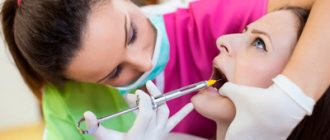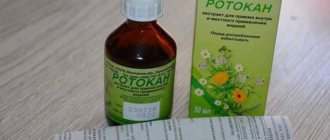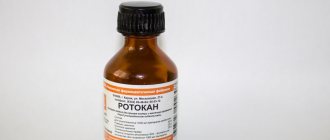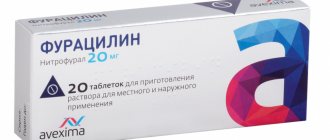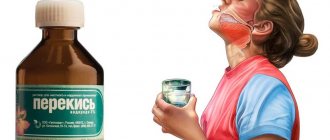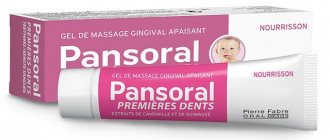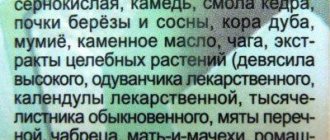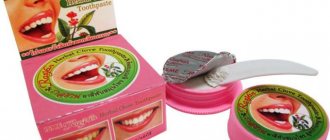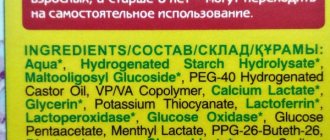Release forms and composition of the drug
The product is available in the form of an aqueous-alcoholic extract. It is a liquid with a pronounced herbal aroma, packaged in 50 ml dark glass bottles. Each bottle is placed in an individual cardboard box, where you can also find detailed instructions for proper use.
The product has a therapeutic effect due to the presence of several active components of plant origin:
- Calendula. The ingredient is present in the form of flowers.
- Chamomile in the form of flowers.
- herb .
As an auxiliary ingredient, the composition contains purified water and alcohol in small quantities. The last ingredient is considered the basis of the extract.
Description of the drug Rotokan
Rotocan is produced in brown glass bottles and is a liquid with a specific smell of medicinal herbs. Sometimes you can find sediment at the bottom of the bottle.
The solution contains:
- calendula;
- chamomile;
- yarrow.
Calendula disinfects and relieves inflammation. The flowers of the plant contain flavonoids and carotenoids. Chamomile has a calming effect on inflamed mucous membranes and has antiseptic properties. The flowers of the plant contain coumarins, phytosterol, flavonoids and choline.
Yarrow herb contains tannins that destroy pathogenic microorganisms. Alkaloids have a hemostatic effect, while resinous substances promote the restoration of damaged tissues and rapid healing.
The basic basis of the medicine is ethyl alcohol diluted with purified water. Like all preparations based on herbal raw materials, Rotokan for teeth does not produce side effects if a person is not allergic to the herbal raw materials included in its composition. You can buy Rotokan at the pharmacy without a prescription.
Medicinal properties of the drug:
- antiseptic;
- anti-inflammatory;
- anesthetic.
The action of the active substances of the drug is aimed at destroying pathogenic bacteria.
Pharmacological properties
Rotokan for rinsing gums during inflammation is effective due to the presence of herbal ingredients in the composition. The solution has antiseptic and anti-inflammatory properties, which makes it possible to use it for various pathologies of the mucous membranes of the oral cavity.
The medicine also has hemostatic properties. This is considered its advantage over other drugs from this pharmacological group. The drug helps not only to destroy microorganisms on the mucous membranes, but also prevents their re-production and spread to healthy tissues.
The hemostatic properties of the drug help prevent bleeding as a result of minor damage to the mucous membranes when brushing teeth and eating solid foods.
Medicinal properties
The pharmaceutical product Rotokan has a complex effect. The combined effect of the drug components ensures a positive treatment result in dental and otolaryngological practice.
The presence of chamomile provides the following effects:
- anesthetic
- antispasmodic
- anti-inflammatory
The bacteriostatic and anti-allergenic effect is ensured by the azulenes contained in the raw material.
Medicinal calendula enhances antimicrobial and some other effects.
Organic acids contained in plants have a detrimental effect on pathogenic organisms.
The antioxidant effect of the drug is ensured due to the presence of carotenoids and lycopenes.
The external hemostatic and healing effect is manifested thanks to the substances that make up the yarrow plant:
- terpenoids
- flavonoids
- complex chemical substances belonging to the aromatic series
Rotokana contains medicinal components that speed up the stop of bleeding in the mouth. The mechanism of action of the drug is based on:
- increased blood clotting
- reducing blood flow to the damaged area
Pharmacodynamics and pharmacokinetics
When the solution is used externally, the therapeutic effect develops over several days after the start of the course. The active components of the product create a kind of protective film on the surface of the mucous membranes of the oral cavity, which not only destroys bacteria, but also prevents their re-spread and reproduction.
Calendula in the medicine helps speed up the process of tissue repair, improves local blood circulation and cell nutrition. Chamomile is considered a powerful natural antiseptic. When using the solution, local defenses increase, pain and swelling are eliminated. These symptoms of inflammation appear quite often.
The drug also has other properties:
- Yarrow herb has a stimulating effect. Has a positive effect on the condition of the mucous membranes.
- The drug prevents the spread of inflammation to healthy tissues and stops the progression of the disease.
- The solution has a mild effect, does not aggravate the course of the pathology and can be used in combination with other medications against oral diseases.
- Stops bleeding, even when it does not occur as a result of brushing your teeth.
- Stimulates cell renewal, prevents damage by pathogenic bacteria.
As a result of the complex effect on tissue, the recovery period is shortened and the development of complications is prevented. When taken orally, the active components are quickly distributed throughout the systemic bloodstream and have a therapeutic effect. They are well absorbed in the body, processed in the liver, and then excreted through the kidneys.
Metabolites of substances do not have a therapeutic effect. When applied topically, the drug is almost not absorbed into the blood, which is considered an advantage, since the risk of overdose is significantly reduced.
In patients with kidney pathologies, the period of cleansing the body from breakdown products of active components slows down somewhat, which can provoke a slight accumulation of substances in the blood. In severe cases of such pathologies, the drug is used in small doses, which greatly facilitates processing and elimination.
In each case, pharmacokinetic features may differ depending on the characteristics of the patient's body.
Flux treatment
Sometimes gum inflammation can take you by surprise on weekends/holidays. What to do if your cheek is swollen from gumboil, and Rotokan is not in the first aid kit? The drug can be replaced by:
- Malavit;
- Furacilin;
- Chlorhexidine;
- Betadine.
If the listed drugs are not available, a soda-salt solution (a teaspoon of each component in a cup of warm water) or medicinal herbs, for example, oak bark, will help. Thanks to tannins, the product destroys pathogenic flora and cleanses the mucous membrane.
How to use Rotokan for flux? You should prepare a solution of the drug and moisten a gauze or cotton pad, then apply the material between the gum and cheek for 20 minutes. There is no need to rinse your teeth after application; refrain from drinking/eating for a while to consolidate the healing effect.
Indications for use
Rotokan is used for different patients, not only for rinsing when gum inflammation occurs.
There are other indications for use:
- Stomatitis of acute and chronic forms. In this case, the drug can be used for aphthous or ulcerative forms of the disease with severe symptoms. The condition is characterized by damage to the mucous membranes of the oral cavity, which leads to discomfort when eating food, liquids and other disorders.
- Inflammation of the gums after implantation.
- Gingivitis as a result of tooth extraction or a filling procedure. The product helps shorten the recovery period. After tooth extraction, complications in the form of inflammation often develop, but the use of the medicine helps prevent the appearance of signs of purulent inflammation.
- Preventive measures before dental procedures. A single use helps to significantly reduce the risk of complications after manipulation.
- Pathologies of the mucous membrane of the throat, for example, tonsillitis, laryngitis and pharyngitis. The condition of patients when using the solution topically improves significantly.
The medicine is not taken internally, but sometimes it is indicated to prevent complications when diagnosing gastritis and gastroduodenitis.
Contraindications
The drug is not prescribed if the patient is intolerant of its components or has a history of a tendency to such manifestations.
Other contraindications include:
- Allergy to herbal remedies containing extracts of chamomile, yarrow, calendula. If the patient has taken such medications in the past and has developed negative reactions, it is advisable to stop using the medication.
- Lactation and pregnancy period . This time is not considered an absolute contraindication, but the use should be agreed with a doctor, as complications may occur.
- Internal bleeding of unspecified origin . The product can be used topically, but oral administration for such disorders can aggravate the condition, despite the hemostatic properties of the solution.
- Stomatitis of candidal origin . If inflammation of the mucous membranes is caused by fungal microorganisms, the use of the product may worsen the course of the disease.
- Purulent lesions in the oral cavity, in which there is a risk of infection entering the blood.
- Chronic alcoholism . It is allowed to use the solution only after the patient’s condition has normalized and the breakdown products of ethyl alcohol have been completely removed from the body.
- Patient's history of traumatic brain injury
Contraindications include atrophic changes in the oral cavity, which may worsen when using an alcohol solution. If the patient experiences discomfort when taking liquid, using a solution may also worsen the condition.
An obstacle to taking the drug orally is considered to be liver and kidney failure of varying forms and severity. Viral hepatitis and acute pathologies of the digestive tract are also contraindications for oral use. In each case, the list of contraindications may increase depending on the patient's condition.
About how douching is done
Is it worth doing this procedure before you visit a gynecologist? Definitely not. In this case, the doctor will not be able to conduct a full examination if you clean the vagina of bacteria. In this case, making a correct diagnosis will be extremely difficult.
For douching you will need a douche bulb, or an ordinary Esmarch mug. Rubber tubes or a syringe must be thoroughly disinfected with alcohol, and then rinsed with boiled water. The tips of Esmarch's mug are usually boiled. You must be sure that medical equipment is completely sterile.
Then you need to prepare the solution and draw it into a syringe.
Dilution, instructions for use, dosage
The product is not used locally in its pure form. It must be diluted with clean water, which helps reduce the concentration of ingredients and eliminate negative effects on the mucous membranes.
For children and adults, the application regimen is different.
For children
Patients over 14 years of age are prescribed short courses using the drug. To do this, add 5 ml of solution to 300 ml of boiled and warm water. The solution is used 3 times a day for rinsing. You should not swallow the product; you must rinse your mouth for 10-15 seconds and then spit out the solution.
The duration of therapy is 5 days. Usually this time is enough to obtain a pronounced therapeutic result. If necessary, a repeat course is carried out after 2-3 months.
Sometimes children with gum inflammation are allowed to make applications, that is, moisten gauze in a diluted solution and apply it to the affected area for 20 minutes. You can use a cotton swab rather than gauze. Such manipulations are carried out 2 to 4 times a day for a week. Use is permitted in case. When the outer sides of the gums are inflamed.
For adults
Adults can also use the application product for gingivitis. The scheme does not differ from that used for children, but the frequency of procedures per day increases up to 5 times at equal intervals.
Rotocam (Rotocanum) for adults is dissolved in 300 ml of boiled water per 5 ml of solution.
Rinsing is also carried out according to the standard scheme, that is, 5 ml of solution is dissolved in 300 ml of boiled water, after which the procedure is carried out 3-4 times a day, depending on the degree of tissue damage. Treatment lasts from 7 to 14 days. A repeat course is allowed to be taken no earlier than after 3 months.
If complications occur, you should stop using the product. If there is no therapeutic effect within 3 days after starting use, you should consult a doctor. Another medication may need to be prescribed.
How to use
Rotokan instructions for rinsing teeth:
- shake the bottle several times;
- open the lid;
- Dissolve a teaspoon of the product in a cup of warm water;
- can now be used for its intended purpose.
Is it possible to increase the dosage of Rotokan solution for gums? If there is no discomfort after rinsing, it is permissible to increase the dosage three times (dissolve three spoons in a cup of water).
How long to keep Rotokan in your mouth for stomatitis? You can rinse for a minute, then spit out the solution. The medicine should not be swallowed. If you do not use the entire cup of solution in one go, discard the rest.
What happens if the solution accidentally gets inside while rinsing? There is nothing dangerous. But it is better to carefully rinse your mouth and spit, so as not to swallow pus or mucus from the oral cavity with the solution.
Additional instructions
- rinse daily for 5 days in a row - several times a day;
- make gauze applications to the affected areas, if possible - apply for 15-16 minutes several times a day;
- To treat periodontitis, a cotton wool tourniquet soaked in the product is placed in the gum pocket for 20 minutes - healing occurs on the third day.
When treating periodontitis, additional rinsing with a solution dissolved in water is used 2 or 3 times a day. Flagella (turundas) soaked in Rotokan are placed once a day. If healing does not occur, it is not recommended to use turundas more than six times.
Alcohol tincture from herbs cannot be used in its pure form, so as not to burn the mucous membrane.
Side effects
The drug often causes complications if used incorrectly. They usually occur when ingested, but can also appear with frequent use as a rinse, when a small part of the solution still enters the digestive tract.
| Organs and systems | Mucous membranes |
| Digestive tract | Burning and pain in the stomach usually appear when taking the product orally, but with frequent rinsing, such symptoms may also appear. The condition is aggravated by nausea and vomiting, stool upset and pain in the intestinal area. If symptoms persist for a long time, there is a deterioration in appetite, up to its complete absence. |
| Nervous system | Disorders of the nervous system can manifest themselves in the form of headaches and dizziness, weakness and fatigue, and sleep disturbances. Such manifestations occur quite rarely, in most cases when ingested. Local use very rarely provokes such disorders. |
| Mucous membranes | When used for rinsing, irritation of the mucous membranes and swelling, and increased sensitivity when eating food are observed. The mucous membranes of the nose and eyes can also be involved in the pathological process; patients experience itching and swelling. |
| Skin | If you are intolerant to plant components, you may develop an allergy. Patients develop rashes of various shapes and sizes on the skin, itching, burning and irritation, and peeling of the skin. External symptoms may be accompanied by systemic disorders such as drowsiness, weakness, and headache. |
Negative reactions when using the solution do not appear so often. The degree of their severity may vary depending on the duration of use and the characteristics of the patient’s body.
Overdose
Rotokan for rinsing gums during inflammation is completely safe. The medicine does not provoke an overdose; such cases have not been recorded by specialists.
Only in some cases appears:
- severe itching;
- burning;
- peeling of the skin.
Patients may report nausea and repeated vomiting, a feeling of dry mouth, and extreme thirst. Such manifestations usually occur when the product is taken orally, but their occurrence cannot be excluded when rinsing the mouth.
Overdose is treated in a hospital setting. The drug does not have a specific analogue, therefore symptomatic therapy is used depending on the severity of certain manifestations.
If a large amount of solution is accidentally consumed, the patient's stomach is washed, after which enterosorbents and other drugs are prescribed to eliminate the manifestations. In some cases, a drip infusion of a solution is required to cleanse the blood of drug breakdown products.
special instructions
The use of the solution when purulent foci form in the oral cavity provokes a worsening of symptoms. When bleeding gums occur against the background of developing dental pathologies, medicine does not always help to cope with severe manifestations.
Use in childhood should be agreed with a specialist. Teenagers from 14 to 18 years old are strictly prohibited from taking the extract orally, even if indicated. If adverse reactions or symptoms of overdose occur, it is important to stop use immediately and seek help. Ignoring symptoms can lead to complications.
When diluting the rinse solution, the proportions must be observed. You cannot add more concentrated extract and less pure water. This can provoke a burn of the mucous membranes of the oral cavity and aggravate the symptoms of the disease.
Choosing a gum rinse
Mouthwashes can be therapeutic, that is, intended for the treatment of specific diseases, and prophylactic, which are recommended by dentists as an additional means of caring for the oral cavity. It is better to select the first ones under the supervision of a doctor, taking into account the individual characteristics of the course of the disease. The latter can be divided into 4 types:
- for the prevention of caries;
- for teeth whitening;
- for gum treatment;
- for comprehensive protection of gums and teeth.
When choosing a mouthwash for each specific purpose, give preference to well-known manufacturers and carefully read the instructions for use. Startsmile recommends.
- CURASEPT ADS 205. Gum rinse contains fluorides and vitamin C. Protects against caries and is not addictive. Recommended for comprehensive care of braces and dentures.
- 4-action Mouthwash. Biorepair offers the ideal rinse option for teeth and gums that are hypersensitive. The rinse restores enamel and prevents caries.
- Paroguard CHX Miradent. Has a pronounced anti-inflammatory effect. Contains chamomile extract. Does not require dilution with water, which makes it convenient for travel or business trips.
- PresiDENT Profi. Therapeutic solution for rinsing gums based on Chlorhexidine. Does not contain ethanol. Suitable for irrigator. Recommended as a rinse for gum periodontal disease.
- "Prevention of gum disease" Donfeel. Can be used for daily care. Removes plaque, has a bactericidal effect and promotes mucosal regeneration.
ATTENTION!
Exceeding the concentration of ethanol in the mouthwash provokes dryness of the oral mucosa!
Drug interactions
When used topically, the drug does not interfere with the action of other medications. Just do not combine external use with the application of local agents with similar therapeutic properties.
When taking the drug orally, you should avoid simultaneous use of alcohol, medications based on the same herbal components, or ethyl alcohol. This can cause complications. The issue of drug interactions is decided by your doctor, so you should consult with him first before starting to use any drug.
Analogs
In the absence of an original drug, it is allowed to use its analogues with similar therapeutic properties.
The most popular substitutes:
- Chlorophyllipt – a popular antiseptic and anti-inflammatory solution based on herbal ingredients. The product can have an oil and alcohol base, is considered very effective, and is actively prescribed to patients with damage to the mucous membranes of the oral cavity.
- Miramistin is a solution with antiseptic properties, which is more often used in gynecology, but can be used to eliminate inflammation of the mucous membranes of the mouth and gums. The medication is available in different concentrations, prescribed in pure form or in the form of a diluted solution.
Analogues of the drug have a pronounced effect, but are used only as prescribed by a doctor, as they can provoke serious complications.
Douching solution
The basis of any solution is clean boiled water. There are various solutions for douching. You can douche with a solution of potassium permanganate, but doctors argue about how effective this method is. The most commonly used are broad-spectrum antiseptics such as chlorhexine.
Remember that it is best to entrust this procedure to medical personnel.
